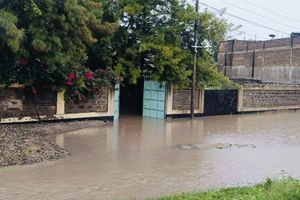UN threatens warring Sudans with sanctions as peace proves elusive

AFP PHOTO
A Sudanese soldier walks next to a damaged vehicle at the airport of Sudan's main petroleum centre of Heglig on April 23, 2012.
After a flurry of activities involving different organisations – from the African Union to the United Nations Peace and Security Council – last week ushered in a glimmer of hope that long-elusive peace will finally return to Sudan.
The prospects for peace appeared tenuous at best, though, as the war drums continued to be sounded even as the belligerents engaged in the usual blame games, amidst much sabre rattling between Sudan and South Sudan.
Hopes for peace were bolstered when China and Russia joined growing calls for an end to the border conflict between the two Sudans which, while still one country, had fought a civil war between 1983 and 2005 that claimed more than two million lives.
The end of the long-drawn and costly war in 2005 was followed by the independence of South Sudan in July 2011, but since then relations between the two neighbouring countries have been at best uneasy, as attested to by sporadic clashes along the common border.
After weeks of bloody clashes, the simmering unease finally exploded into a heated military confrontation after South Sudan overran the Khartoum army and seized the key Heglig oil hub, which is internationally recognised as a part of Sudan, a fact still disputed by the south.
While seizing the hub on April 10, Juba claimed that Khartoum was using it as a base to attack the oil-producing Unity State in South Sudan.
Even as Khartoum denied that claim, the stage was already set for violence in Heglig that was reported to be the worst since South Sudan won independence from Khartoum.
South Sudan’s occupation of Heglig lasted a full 10 days, despite widespread criticism, including by UN Secretary General Ban Ki-moon, who termed it illegal.
In the meantime, the occupation resulted in the shutting down of oil production at Heglig, and the facilities there began leaking even as the belligerents blamed each other for damaging the oil infrastructure, which accounts for about 50 per cent of Sudan’s production.
The pull-out from the disputed hub was only to begin after the South faced heavy aerial bombardment from Sudan. Simultaneously there was intensified international pressure, and the erstwhile tough-talking and patently intransigent President Salva Kiir caved in and on Friday last week announced that his forces would carry out “an orderly withdrawal” from Heglig.
In true Sudanese fashion, however, the circumstances of South Sudan’s pullout from the hotspot were disputed, albeit President Kiir’s undertaking was followed by an announcement last Sunday by Philip Aguer, a Sudan People’s Liberation Army (SPLA) spokesman that the southern army had “completed its withdrawal from Heglig”.
But not surprisingly, given the doublespeak that has become a part of the protracted conflict, Aguer claimed that even as the SPLA was withdrawing from the disputed area, Khartoum’s air force had “continued bombing on the night of [April] 20th and in the morning of the 21st”.
The claims of a voluntary withdrawal were at any rate contradicted by the Sudan army, which claimed it has routed its adversaries from the south and ‘liberated’ the disputed oilfield by force, despite Kiir’s statement to the contrary.
By the time of the withdrawal, whatever the prevailing circumstances, the South had suffered heavy casualties that had resulted in rising displacement of the civilian population, threatening a new humanitarian disaster in a region that can hardly afford it.
To aggravate matters further, the bombardments continued even after South Sudan’s withdrawal from Heglig, prompting increased international concern.
Alarmed by the deteriorating situation, both African and foreign organisations called for immediate negotiations to avert further escalation of violence.
The calls came from different quarters, with US President Barack Obama challenging the warring parties to “have the courage to return to the table and negotiate and resolve these issues peacefully”.
The rising international concern was further boosted last week as China and Russia joined those calling for an end to the border conflict.
The 15-member UN Security Council consequently on Wednesday passed a resolution ordering the combatants to restart African Union-mediated peace talks within two weeks.
The resolution was accompanied by an ultimatum in which the UN further threatened to impose non-military sanctions if either side failed to cooperate.
“Both countries are on the brink of returning to the horrors of the past and threaten to take the entire region with them,” warned US ambassador Susan Rice, while underscoring the need to avoid what she said was a looming ‘full-scale and sustained war’.
The resolution was welcomed by the two warring sides, with South Sudan’s Minister for Cabinet Affairs Dend Alor Kuol registering his country’s “solemn commitment” to comply with the UN conditions.
More attacks
Alarmingly, just one day after the UN resolution, there were allegations by the South Sudan army that Sudanese warplanes and long-range artillery were still bombarding South Sudan border positions in defiance of the Security Council ultimatum with regard to the cessation of hostilities and adherence to AU peace guidelines.
“Their aircraft dropped bombs and artillery was fired targeting an SPLA base,” Southern army spokesman Philip Aguer was quoted as saying. “This is an indication for a ground attack.”
With such allegations coming so soon after the UN Security Council resolution, doubts will remain if the blueprint drafted by the African Union will be honoured.
Apart from seeking to broker a sustainable peace between the two Sudanese states over the years, the AU has in recent times called for “a complete cessation of hostilities”, and a swift resumption of stalled peace talks.
After decades of mutual suspicion, the world is holding its breath as it waits to see if the two Sudans will honour the recent challenge by the AU to consider their “responsibility towards their region, the rest of Africa and the larger international community”.




